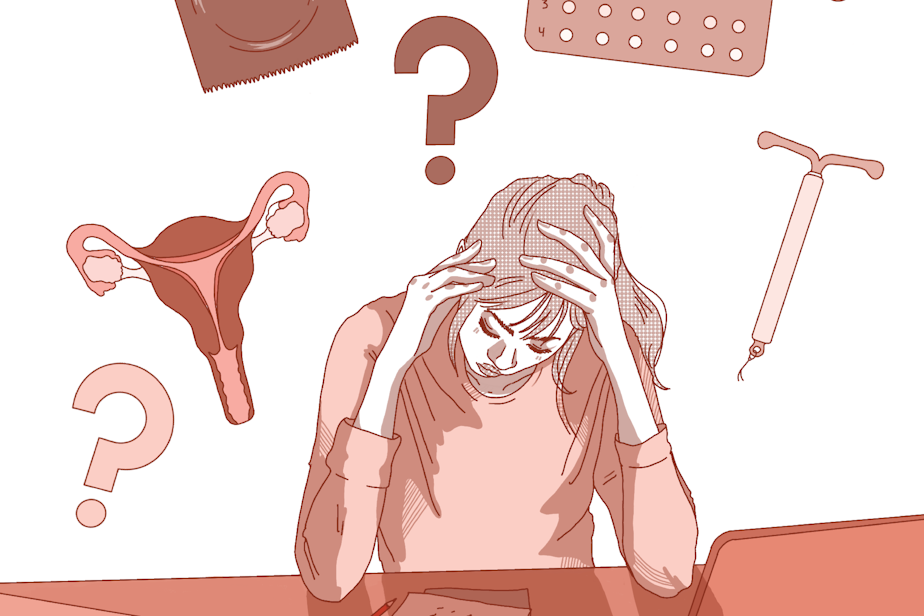Changes are coming to Seattle Public Schools' sex education courses

Students in Seattle Public Schools are taught sex education once during high school, in ninth grade health class.
RadioActive's Lily Turner recently graduated from Nathan Hale High School, where she saw the lack of sex ed throughout high school cause confusion and misinformation among her classmates.
But all this is about to change.
[RadioActive Youth Media is KUOW's radio journalism and audio storytelling program for young people. This story was entirely youth-produced, from the writing to the audio editing.]
R
ecently I was walking down the hallway at school when I heard a group of boys talking about how peeing after sex prevents pregnancy. Which isn’t true.
This inspired me to look into my school's sex education curriculum.
Unlike science or math courses, students only receive sex ed once in Seattle Public Schools. This unit is taught in ninth grade health class alongside units about drug use, physical activity, and social media.
Sponsored
It’s been three years since I took health class, and I don’t remember much. I remember my classmates making condom balloons, and I remember a video about offering someone tea as an analogy for getting someone's consent to have sex.
I talked to a bunch of my classmates, and most of them don’t remember much from that unit either.
My friend Nyla Moxley, who also goes to Nathan Hale High School, said she’s not surprised.
“I have more friends who are sexually active than friends who are sexually knowledgeable,” Nyla said.
Nyla helps educate her friends about sexual health, and I personally have learned a lot from Nyla. She says her peers’ lack of information is scary.
Sponsored
“It genuinely really worries me,” Nyla said. “And not just about the scientific definitions, but, like, [information about] consent and gray areas of consent and sexual assault.”
Nyla says the majority of her information comes from her parents. Other students I spoke to said their knowledge comes from sites like Reddit, Twitter, and even Pornhub.
This worries my health teacher, Devora Eisenberg. She’s been teaching sex education at Nathan Hale High School for more than eight years.
“What concerns me so much about pornography is the nonconsensual aspect to it,” Eisenberg said. "It’s a very unrealistic portrayal of sex, which is very male focused.”
Eisenberg says its important students learn about sex in a classroom.
Sponsored
“This is evidence-based, fact-based education,” she said. “This is where it's normalized, it's neutral. We need to take away the embarrassment and the stigma, and share information so that people can live healthy lives.”
Change is coming.
High school students in Seattle Public Schools will soon get sex ed not just in ninth grade, but in 11th or 12th grade as well.
This is thanks to a state law passed in 2020. The district has been working for three years to implement it.
The additional unit will be squeezed into already existing classes and be taught by general education teachers — meaning your history teacher could end up teaching your sex education course.
Sponsored
Lisa Love, manager of health education for Seattle Public Schools, says revisiting sex ed later in high school means students will have a chance to review accurate information, and learn about more mature, complex topics as they launch into their adult lives.
“Content, particularly around healthy relationships, consent, boundaries, handling rejection, and all kinds of things that have to do with lifelong skills that people will engage in in relationships as they grow up,” Love said.
Love said it's also important that this new curriculum is inclusive of all students, especially LGBTQ students.
“Making sure that we’re using inclusive language in the classroom, that we have explicit lessons talking about their experiences, and making their lived experiences reflected in the curriculum,” she said.
I asked Nyla what she thought about these changes.
Sponsored
“It's about time,” she said.
This story was produced in a RadioActive Youth Media Advanced Producers workshop for high school and college-age youth. Production assistance by Jennifer Wing. Edited by Eilis O'Neill. Additional production support by Kelsey Kupferer.
Find RadioActive on Instagram, TikTok, YouTube and Facebook, and on the RadioActive podcast.
Support for KUOW's RadioActive comes from the Bill & Melinda Gates Foundation Discovery Center and BECU.



